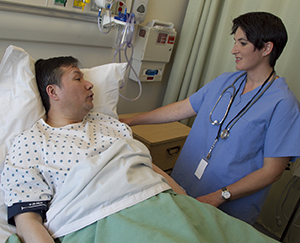Transurethral Resection of the Prostate (TURP): Hospital Recovery
After surgery, you’ll first go to the PACU (post-anesthesia care unit). There you will be closely monitored as you wake up from the anesthesia. Once you are awake and stable, you'll be moved to a regular hospital room.
In some cases, you won’t go home until you can pass urine on your own. You may be discharged with the catheter connected to a draining bag. The hospital stay is often 1 to 7 days.

Having a catheter
-
To cleanse your bladder and prevent blood clots, a tube (catheter) is placed in your urethra. Fluid then flows into and out of your bladder through the tube. This is called continuous bladder irrigation (CBI). The fluid draining from the tube will be reddish and may have some small clots. This is nothing to worry about.
-
The catheter will often stay in place for 1 to 3 days. While it is in, you may feel like you have to urinate. You may also feel cramps in your bladder. If the cramping bothers you or you are in pain, tell the nurse. They may be able to give you medicine to help you feel better.
Urinating on your own
-
In 1 to 3 days after surgery, the catheter is removed. This is done to see if you can urinate on your own.
-
It's common to have a burning feeling when you first pass urine. Also the urine may still look reddish or pinkish. Tell the nurse if your urine is bright red.
-
The amount you urinate may be measured. In most cases, you will go home when you can pass urine without the catheter. If you can’t urinate on your own, you may go home with the tube still in place and a leg bag to collect the urine. In this case, you’ll return to the healthcare provider later on to have the catheter removed.
Before going home
You will be told what to do while you heal. You may be given certain medicines, such as antibiotics, to prevent infection. Ask your healthcare provider when you can start taking aspirin and other medicines again. When you are ready to go home, have an adult friend or relative drive you.
Online Medical Reviewer:
Chelsey Schilling BSN RN
Online Medical Reviewer:
Melinda Murray Ratini DO
Online Medical Reviewer:
Raymond Turley Jr PA-C
Date Last Reviewed:
9/1/2025
© 2000-2025 The StayWell Company, LLC. All rights reserved. This information is not intended as a substitute for professional medical care. Always follow your healthcare professional's instructions.